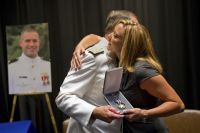WASHINGTON, Sept. 23, 2011 — The threads connecting military services, organizations and individuals became apparent during a ceremony at the Navy Memorial here today, which�honored the bravery and sacrifice of Navy Lt. j.g. Francis L. Toner, who was killed March 27, 2009, in Afghanistan.
The 26-year-old naval officer died defending fellow service members from an enemy who attacked with a firearm while unarmed U.S. troops were conducting physical training.
Navy Adm. Mike Mullen, chairman of the Joint Chiefs of Staff, presented Toner’s posthumously awarded Silver Star to his widow. The admiral said today’s ceremony honoring the 26-year-old’s actions in March 2009 was, in a sense, a celebration of Toner’s life, as his surviving wife, Brooke Toner, had wished.
The event also demonstrated “the way the road winds … through lives that we have come to know,” Mullen said, noting that many of the connections Toner had made in his military life were visible during the ceremony. Among these connections were the Seabees, the Navy’s construction battalion community, of which Toner was part, as a Civil Engineer Corps officer. During a decade of war, Mullen said, certain elements of the military have “changed dramatically,” and noted that “there has been no one that has changed more or done better than the Seabees.”
The chairman asked all Seabees attending today’s ceremony to stand, and several dozen did.
“I have seen you in the fight … and I have so admired the warfighting skills, the compliments you get from soldiers and sailors and airmen, every single trip [I make] to Iraq and Afghanistan,” Mullen said. “People say you live up to the John Wayne movies of the past [‘The Fighting Seabees’], but you’re way beyond that as far as I’m concerned.”
The chairman then spoke of another ceremony attendee, Army Lt. Gen. Richard P. Formica, who now commands U.S. Army Space and Missile Defense Command, Army Forces Strategic Command and Joint Functional Component Command.
Toner died while deployed to Afghanistan supporting an embedded training team. At the time, Formica commanded the Combined Security Transition Command, Afghanistan, where Mullen met him.
“[Formica] was running the training mission in Afghanistan,” Mullen said, acknowledging that it was a “daunting, daunting task.”
“[Formica] is somebody I liked instantly, from the leadership point of view,” the chairman said. “It does not surprise me one bit that Dick Formica led the charge, if you will, to ensure that Frankie [Toner] was properly recognized for his truly heroic … performance on that day.”
The chairman said he and his wife, Deborah Mullen, have gotten to know Brooke Toner since her husband’s death.
“Deborah and I come from Southern California, and I have dear friends … who live in Westlake, which is where Frankie went to high school,” he said. “It’s really … through all those connections that we had the … gift of meeting Brooke, and getting very close to her in this enormous tragedy.”
Mullen noted that Brooke is active in the American Widow Project, a nonprofit organization founded by Army widow Taryn Davis to help other military widows.
“We’ve talked enough to Brooke to know how important the American Widow Project is,” he said. “I know, quite frankly, what an injection of spirit and enthusiasm that connection has been for Brooke, and we’re grateful.”
Mullen noted�that Navy Adm. Jonathan W. Greenert, the new chief of naval operations, who assumed his position earlier in the day, paid�tribute to his wife at today’s CNO change of command ceremony and his joke that good naval officers “marry up.“��
“And we all have, and Frankie did too,” the chairman said. “And anybody that knows Brooke knows that.”
The chairman said he and his wife have interacted with the young widow at Arlington National Cemetery. The Mullens often visit Arlington’s Section 60, where the nation’s most recent war dead are buried, the admiral said.
“There’s not a time that we’re over there that, if we have a moment, [we don’t] go to that section of Section 60 … where Frankie Toner and a young gal named Jessica Ellis, and others that we know” are buried, he said.
“[They] have sacrificed so much, and made such a difference for our country, and done so without questioning,” the chairman said.
TAPS, the Tragedy Assistance Program for Survivors, is a national nonprofit organization that represents “another thread or two” of the military community fabric underpinning today’s ceremony, he said.
“If you don’t know about [TAPS], you ought to know about it,” the chairman said. “They are focused on families of the fallen. They have an annual conference meeting over Memorial Day � 2,000 family members here this last Memorial day, and when it started in the 90s I think there were 10.”
Mullen said at the last TAPS annual meeting, he and his wife met the husband of Navy Lt. Florence B. Choe, who was killed in the same attack that took Toner’s life.
The superintendent and several students of the U.S. Merchant Marine Academy, from which Toner graduated from in 2006, were among those attending the ceremony today.
“Welcome,” the chairman said to the midshipmen. “You’re our future, and this all happens faster than any of us know. And we appreciate that you would raise your hand and serve your country at this extraordinary time.”
Mullen said part of the speech he delivered at the Merchant Marine Academy two graduations ago focused on “that thread of Frankie Toner, who had graduated from there, who so many looked to for inspiration.”
The admiral introduced another officer who was along on Toner’s last run, presenting him to the audience only as “Carlos.”
“Frank Toner was a great friend, a great sailor and an officer,” Carlos said.
He in turn asked other friends from Afghanistan to stand, and said, “The military has made us one family.”
Mullen will retire as chairman of the Joint Chiefs of Staff next week.
Source:
U.S. Department of Defense
Office of the Assistant Secretary of Defense (Public Affairs)

 von
von 
